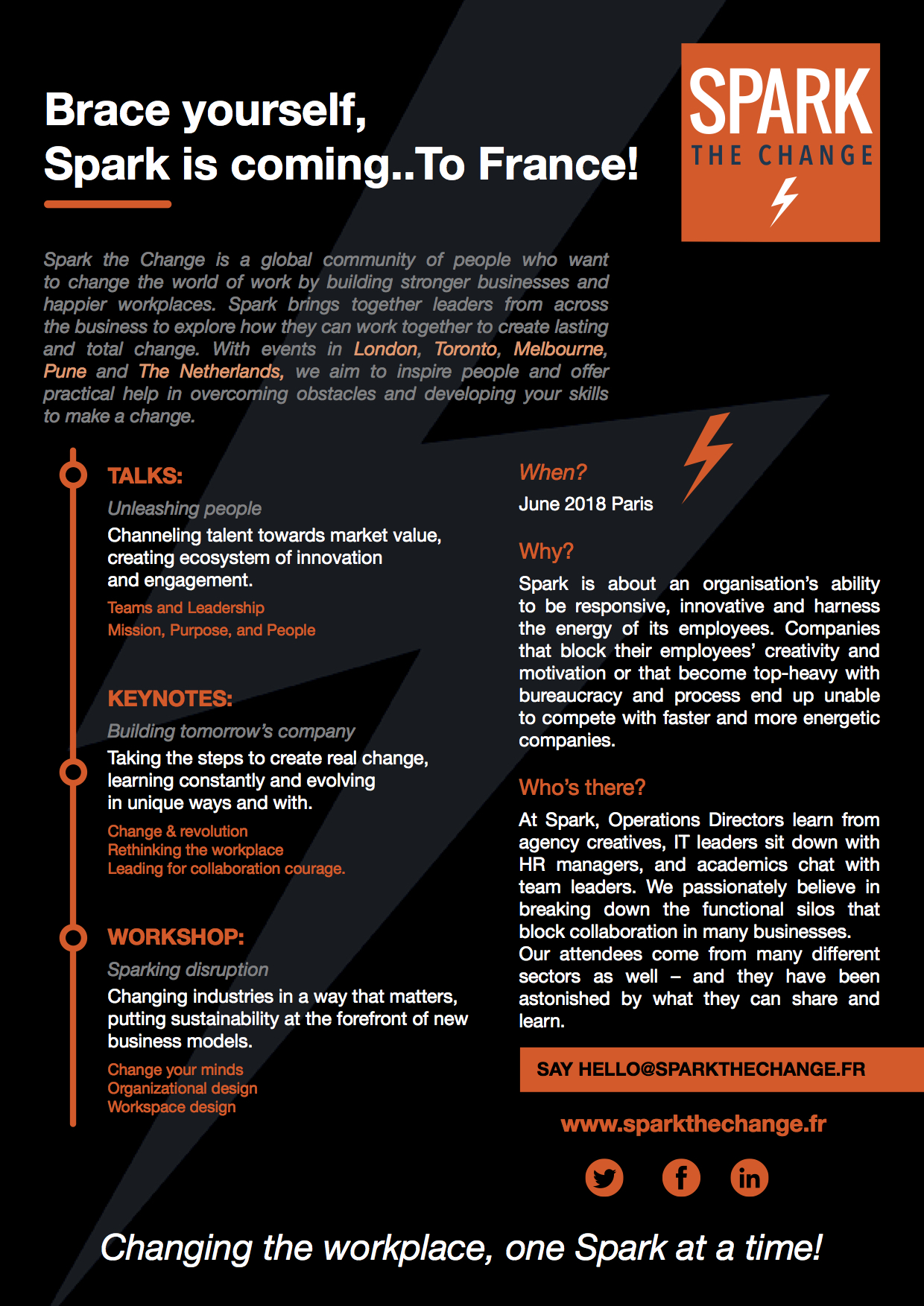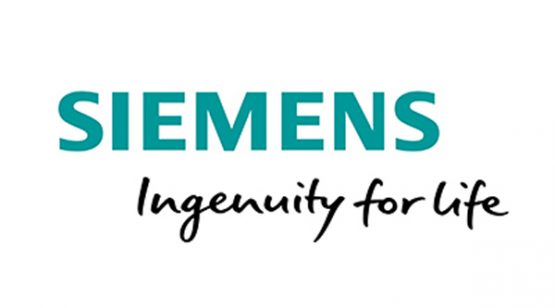Brace yourself Spark the change is coming..To France!


Also published on Medium.

What Rugby Can Teach You about Trust in Agile Teams
Unconditional support, trust, respect, generosity, and courage are the behavioural values required for agile—and also for rugby. On the surface, the software development methodology and the rough team sport may seem to have little in common. But Luis Novella writes that rugby can actually teach you a lot about agile.
When I recently joined an agile team, I suddenly realised I had actually been implementing agile for a few years, just without leveraging the branding. It wasn’t until I listened to Johanna Rothman speak that it dawned on me: Not all things called agile are truly agile, and there are a lot of practices that are agile but are not categorised as such.
Once I understood what agile really means, I realised that I’d seen many of its central tenets contained in another system that’s important to me. Unconditional support, trust, respect, generosity, and courage are the behavioural values required for agile—and also for rugby. On the surface, the software development methodology and the rough team sport may seem to have little in common, but in this article, I’ll show you that agile and the sport of rugby are alike where it really counts—and understanding how to be a team player can improve your career as well as your game.
Trust in Your Teammates
Rugby teaches you to find the most optimal, collectively intelligent strategy within a group of diverse and versatile individuals. When everyone has this mindset, you get sustainability, innovation, and the pleasure of working with a team fully engaged toward a common goal. Overall, rugby is a decision-making game that focuses on shared leadership, and many types of it. It assumes that individuals will be specialists for certain tasks, but they will have the contextual intelligence to make the best decisions for the team based on a deep sense of self-awareness and consciousness of the other team members and the progression toward the goal. Sound familiar?
Despite having played a few rugby games here and there when I was younger, I never imagined the endurance of the behavioral blueprint the sport could generate in a high-performance team. I would argue that the training provided by rugby in terms of behavior is useful regardless of what agile technique or method best fits the particular challenge.
One of the key elements is trust and unconditional support between team members. Despite 160 years of updates, improvements, and new laws, rugby teams at any level still function the same way: When the player with the ball makes a decision, every single teammate actively supports and engages with his position and the context, aiming to provide the best options for the ball carrier (who is always the boss in rugby, if you are into the boss concept). Every player trusts that the decision-maker will make the best choice based on his vantage point, opposition, position on the field, and available support. Once a decision is made, everyone on the team makes the maximum effort for the result of that decision to accomplish the best outcome for the team.
The decision-maker also trusts that everyone behind him will be attentive and available. He believes that if his execution fails, no one will recriminate him; instead, he will be supported. In rugby, you inevitably “fail fast” and make plenty of decisions that turn out to be negative, but you know your innovation was encouraged and respected by the team. Your team trusts that you did the very best you can. They also trust that you have trained and prepared yourself to have been in the best possible condition to play.
Trust releases many opportunities in life. You can innovate and create. You can surprise the opposition. You can discover abilities in your teammates that you did not know were present.
I have had the advantage of working with business leaders who have the courage required to embark in agile transformations the right way—to really and truly happen, change has to start at the top, and the first one to change has to be the inspiration leader. In my opinion, this trust and ability to innovate and err generates pleasure in what we do. It makes our work open and helps us measure and get feedback, because you also trust that the people around you want to make you better.
Just like rugby, agile is a learning system in constant change played by a collectively intelligent team, and the team’s every move is enabled by trust.
By: Luis Novella from the Spark Team
https://www.agileconnection.com/article/what-rugby-can-teach-you-about-trust-agile-teams?page=0%2C1

In the family way
It’s funny how things work out, what we see when we open our eyes and raise our curiosity.
In particular, two events this week that in one moment filled me with dread, then filled me with hope and possibility.
Firstly, on Wednesday a colleague sent me an article from The Economist about the quality of managers in the UK. The article reflected on the following:
The low productivity of British workers has several possible culprits. Inefficient family-run companies are sometimes blamed, as are poor workforce skills. But whereas these problems are well documented, another factor is glossed over: the mediocre performance of British bosses. John van Reenen, director of the Centre for Economic Performance at the London School of Economics, argues that the standard of British management is “significantly below” that in leading countries. His team carried out 14,000 interviews with employees around the world and found that British workers rated their supervisors lower than those in countries such as America, Germany and Japan. “We are not in the premier league,” he says.
Management as a skill has rarely been taken seriously in Britain, where the cult of the gifted amateur prevails. Ann Francke, the head of the Chartered Management Institute (CMI), says that four out of five bosses are “accidental managers”: they are good at their jobs but are then promoted into managing a team or a department, without further training. Unsurprisingly, “they flounder”, she says. Mr van Reenen reckons that about half the productivity gap between Britain and America could be attributed to poor management.
Inefficient family run companies? Funny that, because on the very next day I found myself in need of the services of a family run company. My wife’s lovely Michael Kors watch had used up all of it’s battery charge and a replacement power cell was needed. The most obvious place to get this done is my local Timpsons.
You may know of Timpsons. You may even be a customer of theirs – everything from key cutting, engraving, shoe repair to wrist watch maintenance. But do you know John Timpson’s approach to management?
In a recent article in The Independent, Mr Timpson explained his philosophy.
His way of avoiding top-heavy management is to do away with their jobs. “When I introduced my ‘upside school of management,’ which is putting the customer at the top of the matrix and management at the bottom – and giving staff the freedom to run their own shops – our middle managers didn’t like it at all. Many left.”
As he admitted, Timpson is a funny business. It does all the odd jobs that no one else wants to do, whether its key-cutting or, now, watch and mobile phone repairs. “This wouldn’t have worked if we hadn’t understood the importance of picking the right people and giving them the freedom to look after customers and to decide how to run their shops and to set their own rules. That is the core of our success.”
So what was my experience? As someone who is often frustrated by lack of customer service, I find the whole Timpson experience leaves me with a smile on my face.
I took the opportunity today to ask the 2 guys serving, what is life really like as an employee?
Their answer was simple “Great!”
Why, I asked. “Because we are left alone to get on with it. This is our store. We get guidance, sure, but we make the decisions because we are with the customers every day”.
And how does that make you feel? “Trusted!” was the immediate response.
But does this upside down school of management work commercially?
Well, Timpson recently reported sales up 12 per cent to £189m and profits 38 per cent higher at £18.7m. Furthermore, over the past three years the company has grown rapidly – from 800 stores to 1,400.
Yet again, more evidence that shows having engaged staff not only results in a better, happier work place, it also brings commercial value.
By: Mark Manley from Gaia Leadership
If you would like to learn more about how to build engagement within your organisation, please contact me
mark.manley@gaialeadership.com
I write these articles as part of my own learning. Thank you for reading it.
If you like it, please share it.

Our office is closing! We can do better than just despairing
In March 2015 we received the bombshell from our U.S executives that our office in Oxford was to close as part of a long-term global consolidation of sites with some staff being offered relocation and the others made redundant. The products needed to continue, but how could we avoid the remaining time just being miserable?
Staff were asked to complete their current work and assist with knowledge transfer to the remaining development offices in the USA and India. The previous few years had seen good progress with agile and lean software development, customer satisfaction had steadily risen and staff turnover had been extremely low. So the closure announcement was a body blow. The chance of the announcement being taken badly was all too real with the risk of the situation disintegrating into a depressing mess.
The Oxford management team had the difficult task of trying to make the best of the situation and get the best outcomes for both staff and the company. One year on, the results so far have been remarkably positive. We can therefore make some recommendations for anyone else in this situation, some of which are also worth considering for companies during normal operations.
Actions taken
- Long notice period – We managed to agree 18 months’ notice of the final closure. This was necessary to complete current work and have an effective handover so that the complex medical imaging software products could continue. However, it was a very long time to hope that people would stay so other measures were needed.
- Generous redundancy packages. These were agreed at a level which impressed staff. With their tax-free nature, this gave people confidence that even if they didn’t find another job immediately, they would not have any financial worries for a few months.
- Relocation support – Real commitment was shown to staff to find them other places within Siemens. This included generous relocation packages, funded exploratory visits for staff and families, advice from locals and flexible move dates. This was not cheap, but the cost was much less than hiring and training somebody new.
- Voluntary end dates – Rather than imposing end dates, staff were asked to openly express whether they wanted to stay 6, 12 or 18 months. It’s very hard to predict how people will react so it was better to try to align individual’s needs with business needs. Almost 100% of people got they end date they wanted, most opted for the longer duration and the company had adequate cover.
- Keeping a training budget – Staff were given encouragement to still do training and qualifications. The company would still get some benefit from the training in the short-term, it would help staff with finding a new position, but mostly it helped reassure staff that they could stay and still develop themselves.
- A larger entertainment budget – It was important for people to socialise and support each other so there was an increase in company-funded drinks, lunches and a bigger-than- normal Christmas party.
- Help with job-hunting – Staff were allowed to take some time for interviews and encouraged to have an open discussion on opportunities with support given to try to accommodate people’s wishes where possible. External consultants were available to advise on interview techniques, CV-writing and job hunting.
- Effective use of employee representatives – Rather than just fulfilling a legal requirement, a real effort was made to engage with the elected employee representatives, create a detailed FAQ for staff and share all information on the intranet.
- Continued staff recognition. The office was required to operate properly for an extended period so it was only fair that staff should be treated normally and retain the opportunity to still achieve an above-target bonus and the opportunity for promotion.
- Management care – The managers have been very open, honest and helpful to the staff and shown genuine care and empathy for people and their circumstances. This probably made the biggest difference and enabled so many of the positive results. A site closure can be viewed by staff as a big breach of trust, so asking staff to believe promises about arrangements during the remaining period is a challenge and requires lots of reinforcement, consistency and ensuring that was is said is done.
Results
- Staff morale – This went through the inevitable rollercoaster of shock, anger, worry then acceptance. People were annoyed or upset at the decision, but overall viewed the offers as fair and professional. Staff who had been through a redundancy before thought that the way this was handled was much better. Although losing colleagues is unavoidably sad, people have been positive about making the best of the situation.
- Staff stayed until their agreed date – The long notice period and generous packages meant that most people were fairly relaxed about finding a new position and happy to leave serious job hunting until a few months before their agreed end date. Whilst, it’s an imposed change for everyone, in some cases, staff have appreciated having the “luxury” of having an extended period with a financial cushion during which to calmly think about what alternative job they would really like to do in future. Staff have been open about their hunting and have discussed mutually agreeable end-dates before accepting offers.
- Results still achieved. Work on products continued at a good level. Inevitably people weren’t going the extra mile in quite the same way as they used to but were professional and productive. Staff have been helpful in ramping up new recruits in India and continue to take pride in their products. There have been no surprise, early, resignations or disciplinary issues.
- A surprising number relocated. 25% of people relocated to the USA which was a lot higher than anyone originally expected since people liked being in Oxford.
- Additional social events – The activity in the office “community” if anything picked up since the news with whisky tasting, a pool tournament, team nights out, a group cycle ride around town etc.
- Peer-to- peer training – Staff have shown a great desire to support each other and proactively run open seminars for others in the office to share their knowledge with others (e.g. Sharepoint, Data Science, Android Programming, Arduino programming, Linux etc)
- More cakes – We’ve always provided cakes on a Friday but the number of spontaneous cakes being brought into the office on other days has gone up.
Overall it has been a much more positive experience it could have been. The office morale is still good and the staff have received outstanding praise for their continued professionalism and dedication.
The results has been good for the company as there is a smooth handover taking place while ensuring that people are taken care of. The actions above have not been cheap for the company in the short-term, but are ultimately delivering better long-term value than the alternative of instant site closure followed by disorder and a long period of rebuilding a new team from scratch.
Suggestions relevant for companies not closing
Whilst some of the topics are only relevant to a site closure, some things could be beneficial anytime.
- Management openness is always a good thing. It’s easy to forget the importance of explaining plans and listening to feedback. Make sure there’s time for group meetings, 1 to 1 sessions and occasional surveys.
- Peer-to- peer training is always very cost-effective so time and support should be given for this. Staff have a lot of varied knowledge and it’s motivating for both the trainer and attendees.
- Creative entertainment. It can be an easy area to cut, but pays back a lot. If people have a good social relationship with colleagues, they are much more committed to them and hence also the company. The entertainment does not necessarily have to be lavish e.g. a pool table and tournament, an indoor mini-golf area made out of office accessories and text books, a pancake- tossing event on Shrove Tuesday etc. Something a bit different every few months keeps things fresh. Cakes, are always good.
- Look for the best outcome for both staff and the company given the circumstances. Arrangements with staff have to be fair to get the best results in the long-term.
By: Stephen Wells, Siemens Molecular Imaging, Oxford

